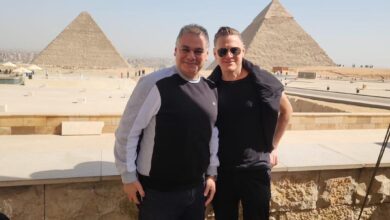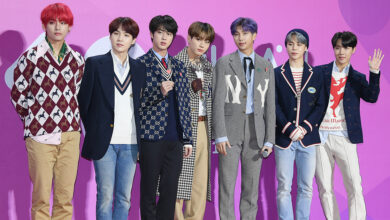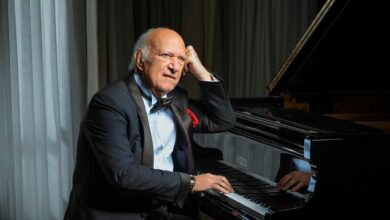
Musical comedy can be a double-edged sword, albeit one with a somewhat blunted blade. Writing a good song is no easy task, neither is writing a good joke, and attempts at combining both efforts often yield results that undermine the potential of both mediums. As a result, the list of comedy songs considered “timeless” is a short one, with few acts proving proficient at combining rhythm and lyrics with the most essential element of comedy — wit. Some Egyptian acts have recently started experimenting with the genre again, among which is the Sharmoofers musical duo.
In recent weeks, Sharmoofers have managed to catch some measure of attention with their song “El-Boxer.” The novelty song’s success (slightly over 39,600 YouTube views at the time of writing) has propelled Sharmoofers to record a full album of similar material.
Egypt Independent caught up with the band’s members Ahmed Bahaa and Mohamed “Moe” al-Arkan to discuss their musical approach and process.
Egypt Independent: So, how did you two get started?
Arkan: I saw someone playing drums on TV, and immediately said to my father, “That’s what I want to do with my life.” And at age twelve, I gave my first live performance.
Bahaa: I started playing the tabla when I was seven, and had my first concert at eighteen.
Arkan: We were friends before [we started] Sharmoofers. We’re both members of a percussion show, and we’ve been friends for a while, having met through our mutual involvement in the music scene.
EI: What about your recording process. The production sounds fairly basic. Do you record at home?
Bahaa: We just moved into our own place together. Before, we’d record in [Arkan’s] bedroom, now we have two rooms just for recording.
Arkan: We record and edit on Logic Pro, and we do everything ourselves. Bahaa writes the lyrics and music and I work on the production side of things. In regards to instrumentation, I play the drums, [while] Bahaa provides the more traditional percussion, the tablas and the riq (tambourine), sometimes the congas.
EI: I’ve noticed that most of your YouTube videos come with similar lines in the video description, usually about how you believe that “music is happiness.” Could you elaborate on that?
Bahaa: We believe music is the key to happiness, and that happiness is music. We’re trying to make music that lifts people’s spirits, that has an infectious energy, but in a positive way. The same goes for our lyrics, which we try to keep light-hearted and relatable. Although we have written one serious-ish song, “Salam Aleikoum” (“Peace Be Upon You”), which is about the struggles of an artist. But generally, we play for happiness.
EI: Which I’m assuming would be a challenge now, given the widespread unrest and anxiety.
Bahaa: But this is the time for it. People always say Egyptians are a humor-loving people, but now that’s not the case. People aren’t smiling as much anymore, which is why we’re doing what we’re doing.
EI: Do you find it hard to stay optimistic in times like these? Is it difficult to write positive, or even light-hearted lyrics?
Bahaa: Sometimes, you get so down and depressed that the only thing you can do is laugh about it. And we’re all getting to that point now, if not already there. It may be difficult to laugh, but what alternative is there?
Arkan: There’s always a bright side, too. You have to remember that, and then look for it.
EI: Given this trend of politically-themed songs and acts, have you been tempted at all to try your hand at something similar, or perhaps criticized for not doing so?
Bahaa: Everyone is good at something. Some bands have been good at writing songs about politics, for example, and some aren’t. Look at a band like Cairokee [which Bahaa is a former member of]. They’ve always been politically active, so for them something like that comes naturally and it’s convincing, they’re not just jumping on the bandwagon. Personally, I’m not that interested in politics, so it wouldn’t be genuine, or convincing. And we don’t want to write stuff that’ll bring people down. We’re not interested in sad songs, break-up ballads or anything like that.
Arkan: We believe in what Bobby McFerrin said, that music should lift people’s souls.
EI: Finally, technology has now made it so that anyone with access to basic computer software can make a professionally sounding album with minimal effort, sometimes contributing to the devaluing of music by lowering standards. How do you feel about that?
Bahaa: Well, it’s good and bad in that it makes things much more accessible, but it also really ups the competition. Which I guess is a good thing.
Arkan: What’s really great about it is that it gives you the opportunity to learn through experimentation, and trial and error. The accessibility, like we just said, makes it so that you can learn at your own pace and focus on what interests you, and that wasn’t possible before. But in terms of how it’s anyone’s right to create, people’s reactions are the only thing that matters.




